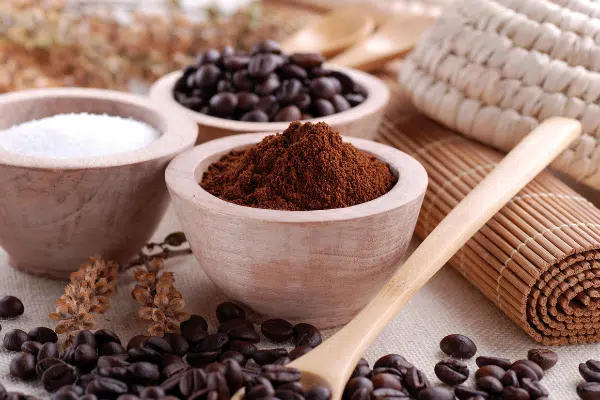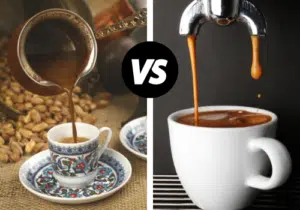Instant Coffee vs Ground Coffee; Health, Taste, Price Differences
Disclosure: This post contains affiliate links and I may earn a small commission (at no extra cost to you) if you click through and make a purchase. Thanks in advance – I really appreciate it!
I have been brewing my own coffee for as long as I can remember. My first experience with instant coffee was when I visited my friend’s place and she had run out of ground coffee but luckily we managed to find a few packets of instant coffee in her kitchen. We made ourselves two cups of instant coffee and the difference in color, taste & consistency when compared to fresh coffee was quite evident from the very first sip.
Key Takeaways:
What is the difference between instant coffee vs ground coffee?
Ground coffee is roasted beans that are ground in a grinder before brewing, whereas instant coffee is a soluble form of pre-brewed coffee that completely dissolves in hot water. One cup of instant coffee contains 30-90mg of caffeine, whereas ground coffee contains 70-140mg of caffeine per cup.
- Ground coffee has a higher caffeine content (70-140mg per cup) than instant coffee (30-90mg per cup).
- Instant coffee tastes watered down and bitter as compared to freshly brewed ground coffee.
- Instant coffee is cheaper than regular ground coffee.
- Both instant coffee and ground coffee have the same level of acidity.
So, what is the difference between instant coffee vs ground coffee?
Ground coffee is roasted beans that are ground in a grinder before brewing, whereas instant coffee is a soluble form of pre-brewed coffee that completely dissolves in hot water. One cup of instant coffee contains 30-90mg of caffeine, whereas ground coffee contains 70-140mg of caffeine per cup.
The differences don’t just end there. In this article, I’ve looked into the most common considerations when it comes to instant coffee vs ground coffee, such as their overall impact on health, caffeine content, taste, acidity, cost, and much more.
This article is an in-depth comparison between the two to help you choose the one that best suits you.
Instant Coffee Vs Ground Coffee
Coffee is one of the healthiest drinks you can have, it’s full of antioxidants, boosts your mental alertness and cognitive functions, and is consumed and loved all over the world. However, when it comes to making a choice between ground coffee and instant coffee, the debate is still ongoing.
Although ground coffee is probably the most popular form of coffee and the one that most people think of when they hear the word coffee, sometimes the wait for your coffee can prove to be just too long, this is when instant coffee may seem like the perfect alternative to your go-to pick-me-up.
Before we can understand the instant coffee vs ground coffee differences, first let’s find out what each one of them is.
What is Instant Coffee?
Instant coffee is made in factories from whole coffee beans that are roasted, ground, and brewed. The manufacturer converts brewed coffee into coffee granules that can dissolve completely in hot water. Instant coffee doesn’t need to be extracted or filtered and has less caffeine than ground coffee.
Instant coffee is sometimes referred to as soluble coffee. This beverage is a product of coffee beans that have been processed to make the whole process simple for the consumer. Instant coffee is in fact made from real coffee. Whole beans are roasted, ground, and brewed before they take the form of instant coffee that we see in packets. What makes coffee instant is when all the water is removed from the brewed product, leaving behind dehydrated crystals of coffee.
There are actually two methods for making instant coffee. In the first, liquid coffee is sprayed in a fine mist in a larger tower or container with very hot (about 480 degrees F) and very dry air blowing through it. By the time the coffee droplets land at the bottom of the container, they have dried into small crystals.
The second method is freeze-drying that involves a few steps. First, the coffee is cooked down into an extract. The coffee extract is chilled at about 20 degrees F into a coffee slushie. The coffee slushie is then further chilled on a belt, drum, or tray to -40 degrees F until it forms slabs of coffee ice. The coffee ice is broken into granules.
These granules are then sent to a drying vacuum where the ice is vaporized, leaving behind granules of instant coffee.
Both methods have an adverse effect on the flavor and caffeine content in the reconstituted coffee.
Before packaging, the coffee powder is supplemented with additional flavor and aroma compounds to better simulate fresh coffee.

What is Ground Coffee?
Ground coffee is made from whole roasted coffee beans. The coffee beans are grown on the plantation and shipped to coffee shops and factories to be roasted, grounded, packed, and marketed. Ground coffee is either bought from the store or roasted beans are ground before brewing coffee.
Whole bean coffee is marketed whole and the responsibility of grinding the beans is left on the buyer. Commonly, whole beans are grounded just a few moments before brewing so the taste of the coffee is balanced and fresh compared to packaged ground coffee.
Roasted coffee beans can be ground in various textures – anywhere from almost a powder to very coarse and grainy sand.
The brewing method you use also dictates the coffee grind size that you must use. I strongly recommend that you use pre-ground coffee if you use drip brewers such as the manual pour-over or a standard coffeemaker. Since pre-ground coffee has the perfect coarseness for these machines.
The different variations in the size of ground coffee work better than others in different brewing techniques.
The problem of using coarser coffee grounds with the wrong brewing method is that the coffee is filtered too fast resulting in a weak flavored drink.
If the ground is too fine, the flavor becomes bitter as it is overly extracted. Using pre-ground coffee beans removes the guesswork when it comes to determining the grind size.
Instant Coffee Vs Ground Coffee Caffeine Content
Ground coffee has a higher caffeine content (70-140mg per cup) than instant coffee (30-90mg per cup). Ground coffee doesn’t go through multiple stages of processing as instant coffee so most of its essential oils and caffeine are preserved which gives coffee a richer aroma and a balanced taste.
Research suggests that moderate caffeine consumption may be associated with a range of physiological effects, including mental and physical performance.
More caffeine isn’t necessarily always a good thing, however, as it will impact each individual differently.
Caffeine has a variety of health benefits that come from its interaction with neurotransmitters in your brain. Some acute effects include improved focus, increased alertness, a general boost to cognitive function, and enhanced short-term memory.
Caffeine has many negative effects too, which include insomnia, jitteriness, nervousness, irritability, rapid heart rate, and headaches.
Instant Coffee Vs Ground Coffee Health Effects
Instant coffee and ground coffee contain the same amount of antioxidants and nutrients that provide many health benefits and protection against diseases. Instant coffee also contains less caffeine but more acrylamide (harmful chemical formed when coffee beans are roasted) than ground coffee.
Although instant coffee is slightly different than regular coffee, it provides many of the same positive effects on your health as ordinary coffee.
Instant coffee, just like regular ground coffee can help in boosting your metabolism, increasing longevity, and decreasing the risk of developing type 2 diabetes. But there are a few downsides to instant coffee that you should know about.
First, as I already mentioned, instant coffee has less caffeine than regular ground coffee.
Though less caffeine is not necessarily bad for your health, it could lead coffee lovers to drink more cups of instant coffee than they intend to, to get their regular daily dose of caffeine.
Also, since instant coffee is “instant” and easy to make, there is a risk of drinking more cups than you would if you had to make coffee from scratch either in a machine or manual pour-over.
Secondly, Instant coffee contains about two times more acrylamide than regular ground coffee. Acrylamide is a harmful cancer-causing chemical compound that is formed when coffee beans are roasted. Acrylamide is not just carcinogenic but can also be harmful to the nervous system.
Instant Coffee Vs Ground Coffee Taste
Instant coffee tastes watered down and bitter as compared to freshly brewed ground coffee. Instant coffee undergoes processing where it is exposed to extreme hot and cold temperatures which impact its taste negatively. Moreover, instant coffee is generally manufactured from bitter Robusta beans.
Instant coffee has long had a bad reputation for tasting, well, terrible. Even the best brands don’t seem to stand up next to a cup of traditionally brewed coffee. The most common complaint about instant coffee is that it has a chalky consistency and a bitter, almost sour taste.
The process of making instant coffee starts as a real, liquid coffee. Companies harvest beans, roast them, and make a concentrated brew out of them. If manufacturers use cheap bad coffee beans, the instant coffee will also turn out quite bad-tasting.
The making of instant coffee involves spraying liquid coffee into the dehydration chamber means exposing it to intense heat. The heat changes the chemicals in the coffee. As a result, it turns out burnt, bitter, or sour.
Moreover, instant coffee is used to serve quick, affordable, and bulk amounts of packed coffee. For this reason, each step, from selecting beans to the brewing temperature, does not get the care and attention needed to make a great-tasting brew.
Also, manufacturers generally use cheaper Robusta beans to make instant coffee. Although Robusta beans are known for their high caffeine content, they contain less of the great-tasting sugars and fats and aromatic essential oils found in the fresh Arabica beans.
For manufacturers, this obviously saves costs, but as consumers, we end up with a weak, bitter-tasting cup of instant coffee.
To summarize, although instant coffee is made from ground coffee that was already brewed, it goes through processing and extreme temperature changes which negatively impacts its taste.
Ground coffee has much more flavor and will give you a broader aroma, with more depth because it has all its essential oils and other chemical constituents intact
Instant coffee is flat, and often very bitter. Once you’ve had actual coffee brewed from ground coffee instant coffee will seem very weak and flat in comparison.

Instant Coffee Vs Ground Coffee Price
Instant coffee is cheaper than regular ground coffee. While more production time and effort is put into the manufacturing of instant coffee, it is generally made in bulk using cheaper coffee beans which lowers the overall cost of coffee. Also, no special equipment is needed to make instant coffee.
Realistically, it would seem that instant coffee would be more expensive, but actually, ground coffee costs more.
Because more effort is put into manufacturing instant coffee upfront through the brewing process, which is followed by the cooling and drying, it would make sense that it is more expensive. But instant coffee is usually made from low-quality cheap Robusta beans and that too in bulk. Both these factors – cheaper beans and bulk manufacturing drive down the production cost considerably, which in turn reduces the overall cost of instant coffee.
You don’t even need any special equipment to make instant coffee, whereas to make freshly brewed ground coffee you would at least need a kettle, or a grinder and a coffee maker, and both of those tools can come at significant expense depending on how sophisticated you get. Add electricity cost on top of this and you will soon realize why instant coffee is a much cheaper option for your daily pick-me-up.
Instant Coffee Vs Ground Coffee Brewing
The brewing process is a big decider when it comes to instant coffee vs ground. Needless to say, the coffee with the word “instant” has an upper hand when it comes to the ease of brewing.
When making ground coffee you have to wait around for it to brew for a few minutes, clean the machine and throw away the coffee grounds, and then you can enjoy your beverage.
On the other hand, nothing could be simpler than making instant coffee. Measure the granules, add hot water, and you’re done! The whole operation takes a few seconds.
You just can’t do that with ground coffee. Whether you start with whole beans that must be ground, or you have ground coffee ready at hand, preparation will take a few minutes at the very least – even if you don’t have to clean the grinder and the coffee maker.
Ground coffee has a wide selection of preparation techniques and each is different than the next, each will give a different coffee experience and each demands a different grind.
Depending on the form of coffee you’re trying to make, it can be a little difficult to remember all of the things you have to do in order to make the perfect cup.
For example, making an espresso would take a large investment of time and money. You will also need special skills to pull a perfect shot of espresso, whereas to make a cup of instant coffee, there’s no complicated learning curve or special skill to be learned. Just add the specified amount of powder, crystals, or paste into hot water or milk and give it a good stir. Voila! Your instant coffee is ready to be enjoyed.
Instant Coffee Vs Ground Coffee Acidity
Both instant coffee and ground coffee have the same level of acidity. The acidity of instant coffee is determined by factors like the type of coffee bean, roasting process, and place of origin among other factors.
The acid content in coffee depends on the type of bean used to make the coffee, conditions under which coffee was grown, and the roasting method. It does not matter if the coffee is instant or ground for brewing.
Arabica beans are the most popular beans and are considered by many to be superior to Robusta beans because of flavor and lower acidity.
Arabica beans are more pleasant because they contain almost double the amount of sugar compared to Robusta beans and half the caffeine level.
Also, when it comes to the type of roast, dark roasted coffee beans retain less acid than lighter roasts. The process of dark roasting stimulates the extraction of a chemical that helps in inhibiting the stomach acid. Hence, dark roasts are often referred to as stomach-friendly coffee.
Instant Coffee Vs. Ground Coffee: Pros And Cons
Instant coffee tastes the same, with the only difference being the brand. Ground coffee can taste so many ways, depending on how you brew it.
As we know that both instant coffee and ground coffee have almost the same health benefits too, let us consider the general pros and cons of each type of coffee.
Instant Coffee
Pros
- Preparation is fast and convenient.
- Cheaper than ground coffee or store-bought coffee.
- Can be carried along when traveling.
- Contains less caffeine.
- Comes in a wide variety of flavors.
- Produces almost no waste.
- Provides the same health benefits as ground coffee.
Cons
- Weak, watered-down bitter taste.
- Contains higher concentrations of acrylamide.
- Contains less caffeine.
- Not for coffee connoisseurs.
- Some types of instant coffee may contain various sweeteners and oil-based creamers.
- Fewer nutritional benefits than ground coffee.
Ground Coffee
Pros
- Aromatic, rich, and balanced taste.
- Contains nutrients and antioxidants.
- Can be brewed in multiple ways.
- Produces wonderful flavors when brewed properly.
Cons
- More expensive than instant coffee.
- Requires some time and effort to brew a good cup of coffee.
- Needs equipment such as a grinder and coffee maker or a kettle.
- Produces more waste.
- Needs a little bit of practice.
Frequently Asked Questions
Which is better instant coffee or ground coffee?
Although instant coffee and ground coffee contain the same amount of antioxidants and nutrients, instant coffee contains slightly less caffeine but more acrylamide which is a carcinogenic chemical compound that is produced when coffee beans are roasted.
How do you make instant coffee with ground coffee?
To make instant coffee with ground coffee beans, grind beans on the finest setting of coffee grinder. Grind the coffee to as fine a powder as the grinder will grind to. Pour the coffee powder into a bowl through a sieve. Regrind any coffee that’s left in the sieve to the finest possible grind size.
What is cheaper instant coffee, or ground coffee?
Instant coffee is cheaper than ground coffee. The production of instant coffee requires more time and effort up front, but since it’s produced in bulk using low-quality cheap Robusta beans, it brings down the overall cost of production and the retail price of instant coffee.

Amit Gupta
Hi, my name is Amit Gupta, and I am the owner and contributor at Cafeish. My obsession with coffee started when I received my first French press as a gift almost ten years ago. Since then, my love of coffee – and the number of coffee gadgets I own – has grown considerably.
Most Popular
ABOUT US
We are a team of coffee affcianados with experience and expertise in making world renowned coffee. In fact, preparing the best coffee ever with a fluffy top reminds us of magic, with secrets of how to achieve each particular effect. Making coffee is not our only hobby, we always keep our ears open as to what’s happening around and what scientists and manufacturers produce for consumers. It’s not an easy task to do – it’s rather time consuming. Hence, Caféish website was launched.
LEGAL DISCLAIMER
Caféish is a participant in the Amazon Services LLC Associates Program, an affiliate advertising program designed to provide a means for sites to earn advertising fees by advertising and linking to Amazon.com. Caféish also participates in affiliate programs with Clickbank and other sites. Caféish is compensated for referring traffic and business to these companies.




